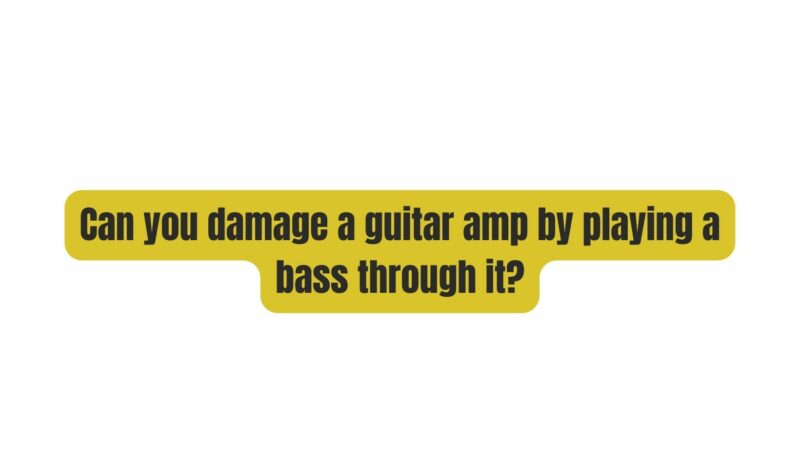The world of music is full of experimentation and exploration, and sometimes musicians are tempted to push the boundaries of their equipment to achieve unique sounds. One such endeavor is using a guitar amplifier to play a bass guitar. However, this unconventional approach raises a crucial question: “Can you damage a guitar amp by playing a bass through it?” In this comprehensive exploration, we will delve into the intricacies of this musical experiment, examining the potential risks, the differences between guitar and bass amplifiers, and the best practices for safely exploring this sonic territory.
Understanding the Differences Between Guitar and Bass Amplifiers
Before we address the question of whether playing a bass through a guitar amp can be damaging, let’s examine the key differences between guitar and bass amplifiers:
- Frequency Range: Bass guitars produce lower frequencies compared to standard electric guitars. As a result, bass amplifiers are specifically designed to handle the lower end of the sonic spectrum, providing the necessary power and speaker configurations to reproduce these frequencies accurately.
- Speaker Size and Design: Bass amplifiers typically feature larger speakers, often 10 inches or 15 inches in diameter, to effectively project low-frequency sounds. Guitar amplifiers, on the other hand, commonly use smaller speakers optimized for midrange and high-frequency tones.
- Amplifier Power: Bass amplifiers are built with higher wattage to handle the demands of low-frequency reproduction. Guitar amplifiers may have lower wattage, as they don’t require as much power for the mid and high frequencies.
- Tone Control: Guitar amplifiers often provide tone-shaping options that emphasize the midrange frequencies, while bass amplifiers offer controls tailored to bass frequencies, including bass and treble EQ adjustments.
- Distortion and Overdrive: Guitar amplifiers often include distortion and overdrive channels that accentuate midrange frequencies, while bass amplifiers focus on clean, undistorted sound, as excessive distortion can compromise low-end clarity.
Now that we understand these fundamental differences, let’s explore the potential risks of using a guitar amplifier with a bass guitar.
Potential Risks of Using a Guitar Amp for a Bass Guitar
While it’s technically possible to connect a bass guitar to a guitar amplifier and produce sound, there are potential risks and limitations to consider:
- Speaker Damage: The primary concern when using a guitar amp for a bass guitar is the potential for speaker damage. Guitar amp speakers are not designed to handle the lower frequencies produced by a bass guitar. Pushing a guitar speaker to reproduce frequencies beyond its intended range can lead to speaker distortion, overheating, and even speaker cone damage.
- Distorted Sound: Playing a bass through a guitar amp can result in distorted and muddy tones. Guitar amplifiers are optimized for midrange frequencies, which can’t accurately reproduce the full richness and depth of bass guitar tones.
- Wattage Limitations: Guitar amplifiers often have lower wattage ratings compared to bass amps. This means that they may not provide enough power to handle the demands of a bass guitar, especially at higher volumes. Pushing a guitar amp beyond its wattage capabilities can lead to amplifier overheating and potential damage.
- Lack of Bass Control: Guitar amplifiers typically lack the necessary tone controls to shape bass frequencies effectively. This can result in an unbalanced and undesirable sound when playing a bass guitar.
- Reduced Clarity: Using a guitar amplifier for a bass guitar may result in reduced clarity and articulation, making it challenging to achieve a well-defined bass tone.
Best Practices for Safely Experimenting with a Bass Through a Guitar Amp
While the risks associated with using a guitar amp for a bass guitar are real, there are situations where musicians may wish to explore this unconventional setup. To do so safely and effectively, consider the following best practices:
- Limit Volume: If you decide to play a bass through a guitar amp, keep the volume at a moderate level. Avoid pushing the amplifier to its limits, as this can lead to speaker damage and distortion.
- Use EQ Pedals: Consider using external EQ pedals or processors to shape the bass frequencies before they reach the guitar amp. This can help compensate for the amp’s limitations and provide better control over your bass tone.
- Monitor Speaker Health: Pay close attention to the amplifier’s speaker while playing. If you notice any unusual sounds, distortion, or overheating, immediately stop and disconnect the bass guitar to prevent potential speaker damage.
- Explore Alternative Amps: If you frequently play bass guitar or intend to incorporate bass into your music, it’s advisable to invest in a dedicated bass amplifier. A bass amp is designed to handle the specific requirements of bass frequencies and will provide a more accurate and satisfying bass tone.
- Consult the Manufacturer: If you’re unsure about whether your guitar amp can handle a bass guitar, consult the manufacturer’s guidelines or customer support for recommendations.
Conclusion
In conclusion, while it is technically possible to play a bass through a guitar amplifier, there are inherent risks and limitations to consider. The primary concern is the potential for speaker damage due to the mismatch between the frequencies produced by a bass guitar and the capabilities of a guitar amp. To explore this unconventional setup safely, it’s crucial to exercise caution, limit volume levels, and monitor the health of the amplifier’s speaker. However, for those serious about playing bass guitar, investing in a dedicated bass amplifier is the most advisable course of action. A dedicated bass amp will provide the necessary power, tone shaping, and clarity required to produce a rich and well-defined bass sound without compromising the integrity of your equipment. Ultimately, while experimentation is a valuable aspect of music, it’s essential to prioritize the longevity and performance of your gear when pushing its boundaries.


